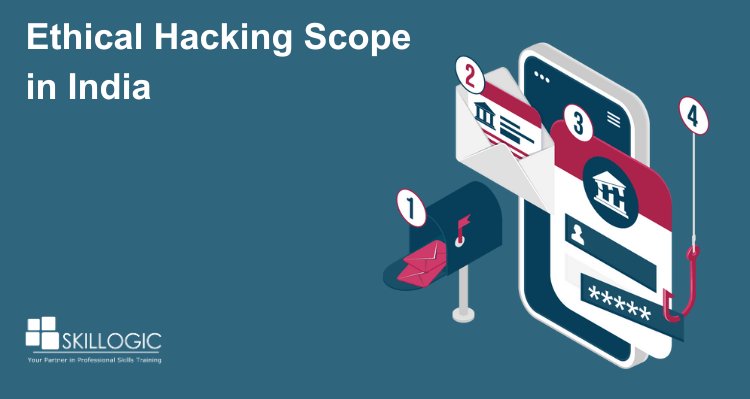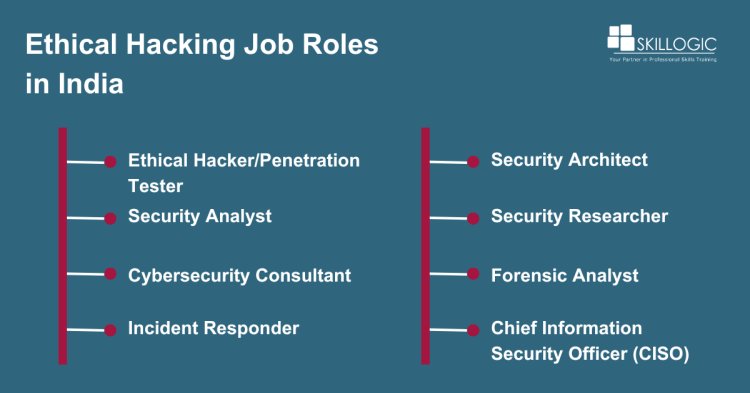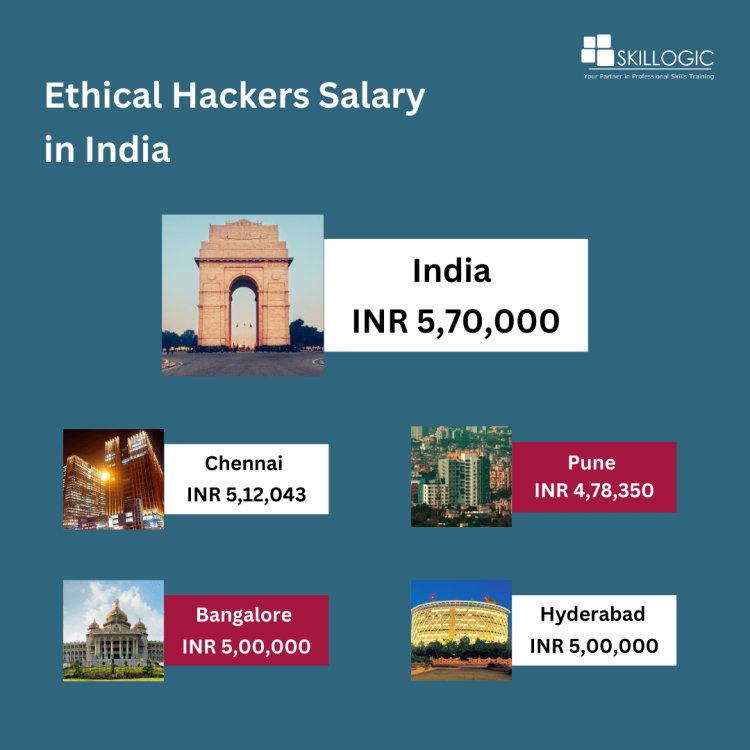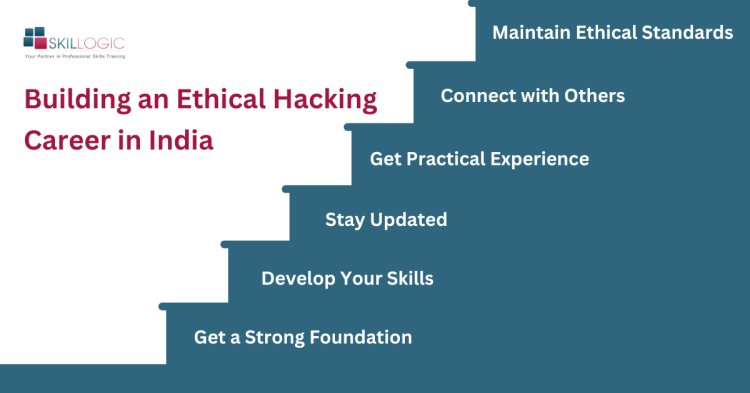Ethical Hacking Scope in India

In today's tech world, ethical hacking is like being a good guy detective in the digital universe. It's about using your computer skills for good, like a superhero fighting cyber villains. Now, let's talk about something really interesting: the scope of ethical hacking in India. We'll explore what it means, why it matters, and how it's becoming crucial for keeping our digital world safe. From uncovering online secrets to protecting our country's internet borders, let's dive into the exciting world of ethical hacking and see how it's making a difference in India.
Understanding Ethical Hacking
Ethical hacking is like being a cyber superhero, but on the right side of the law. These experts, also known as white-hat hackers, use their computer skills to find weaknesses in systems before the bad guys do. It's all about protecting digital territories from cybercriminals, ensuring our online world stays safe and secure.
In our hyper-connected world, where everything from our phones to our banks is online, cybersecurity is crucial. Ethical hacking helps keep our digital lives safe by finding and fixing vulnerabilities before hackers exploit them. It's like having a team of digital guardians constantly watching over our online playground.
India is sprinting into the digital age, but with great digital opportunities come great digital risks. Cyber threats are on the rise, targeting everything from government websites to personal data. Ethical hacking is becoming increasingly important in India to protect against these threats, with demand growing for skilled professionals to safeguard our digital borders.
Read these articles:
- Who exactly is a hacker?
- Difference between Cyber Security & Ethical Hacking
- What really is Hacking?
Understanding What Ethical Hacking is and Who Ethical Hackers are
Ethical hacking is a way of using hacking skills for good purposes. Instead of causing harm or stealing information, ethical hackers use their expertise to find and fix security weaknesses in computer systems, networks, and software. They're like digital detectives, constantly searching for vulnerabilities before cybercriminals can exploit them.
Ethical hackers, also known as white-hat hackers, are often employed by companies, government agencies, or cybersecurity firms to help strengthen their digital defenses. They have a deep understanding of how hackers think and operate, allowing them to anticipate potential threats and develop effective countermeasures.
These hackers are not just skilled in technology; they also have a strong sense of ethics and responsibility. They follow strict codes of conduct and laws to ensure that their actions are legal and ethical. Ethical hackers aim to protect individuals, businesses, and organizations from cyberattacks, safeguarding sensitive data and preserving digital privacy.
Ethical hacking is a dynamic and challenging field that requires continuous learning and adaptation. Ethical hackers stay updated on the latest cybersecurity trends, tools, and techniques to stay ahead of evolving threats. Their work is essential in maintaining the security and integrity of digital systems in an increasingly interconnected world.
Ethical Hacking Career Scope in India
In India, the field of ethical hacking has seen significant growth in recent years, driven by the rapid expansion of the digital landscape and the increasing reliance on technology across various sectors. With the proliferation of e-commerce, online banking, digital government services, and the Internet of Things (IoT), the demand for cybersecurity professionals, including ethical hackers, has surged.
Ethical hacking isn't just about stopping cyber bad guys; it's also big business. Cybersecurity Ventures predicts that by 2031, the global market for penetration testing a key part of ethical hacking will top $5 billion yearly. This means ample job opportunities in both government and private sectors, where companies and organizations are eager to fortify their digital defenses.
The ethical hacking industry in India is vibrant and diverse, encompassing a wide range of organizations, including IT firms, cybersecurity companies, government agencies, financial institutions, and multinational corporations. Many Indian companies are increasingly recognizing the importance of proactive cybersecurity measures to protect their digital assets and sensitive data from cyber threats.
Refer to this article: Why Choose Ethical Hacking as a Career?
Now, let's delve into the various ethical hacking job roles in India:
- Ethical Hacker/Penetration Tester: Responsible for identifying and exploiting vulnerabilities in computer systems, networks, and applications to assess their security posture.
- Security Analyst: Analyzes security breaches or potential threats, conducts risk assessments, and implements security measures to safeguard against cyberattacks.
- Cybersecurity Consultant: Provides advisory services to organizations on cybersecurity best practices, conducts security audits, and develops strategies to enhance overall security posture.
- Incident Responder: Responds to cybersecurity incidents, investigates security breaches, and develops incident response plans to mitigate future risks.
- Security Architect: Designs and implements secure IT infrastructures, including networks, systems, and applications, to protect against unauthorized access and data breaches.
- Security Researcher: Conducts in-depth research on emerging cyber threats, vulnerabilities, and attack techniques to develop innovative security solutions and countermeasures.
- Forensic Analyst: Collects and analyzes digital evidence related to cybercrimes, such as hacking, data breaches, and malware infections, to support legal investigations.
- Chief Information Security Officer (CISO): Leads the organization's cybersecurity efforts, develops cybersecurity policies and strategies, and oversees the implementation of security measures to protect against cyber threats.

Now, let's explore the ethical hackers salary in India:
In India, the average salary for an Ethical Hacker is ₹570,000 per annum, according to Payscale. Across the top cities in India:
- Chennai: Ethical hackers in Chennai earn an average salary of around ₹512,043 per annum, reflecting the city's bustling financial and tech sectors.
- Bengaluru: In the tech hub of Bengaluru, ethical hackers command an average salary of approximately ₹500,000 per annum, driven by the city's thriving IT industry and cybersecurity demand.
- Pune: Ethical hackers in the capital city earn an average salary of about ₹478,350 per annum, reflecting the robust cybersecurity needs of government agencies and corporations.
- Hyderabad: Ethical hackers earn an average salary of around ₹500,000 per annum, benefiting from the city's growing IT and cybersecurity ecosystem.

Key Industries Benefiting from Ethical Hacking Services
Financial Sector: Banks, insurance companies, and other financial institutions are prime targets for cyber attacks due to the sensitive nature of the data they handle. Ethical hacking services help identify and patch vulnerabilities in their digital infrastructure, ensuring the security of customer information, financial transactions, and critical systems.
Healthcare: With the digitization of medical records and the increasing use of connected medical devices, the healthcare industry faces significant cybersecurity challenges. Ethical hackers assist healthcare organizations in securing patient data, protecting medical devices from unauthorized access, and ensuring compliance with data privacy regulations like HIPAA.
Technology Companies: Tech giants and startups alike rely on ethical hacking services to strengthen the security of their products and services. Ethical hackers perform thorough security assessments, identify potential weaknesses in software and hardware, and help mitigate risks before products are released to the market.
Government Agencies: Governments worldwide enlist the help of ethical hackers to bolster their cybersecurity defenses and protect sensitive information from cyber threats. Ethical hacking services play a crucial role in safeguarding national security, defending against cyber espionage, and ensuring the resilience of critical infrastructure.
E-commerce and Retail: Online retailers and e-commerce platforms handle vast amounts of customer data, including payment information and personal details. Ethical hacking services help these businesses fortify their online platforms against cyber attacks, prevent data breaches, and maintain customer trust in their security measures.
Energy and Utilities: Power plants, utilities, and other infrastructure providers are increasingly digitizing their operations, making them susceptible to cyber threats. Ethical hacking services are essential in identifying vulnerabilities in control systems, SCADA networks, and smart grid technologies.
Read this article: All About Ethical Hacking
Building an Ethical Hacking Career in India
Building a successful career in ethical hacking in India involves a few key steps:
- Get a Strong Foundation: Start with learning the basics of computer science, networking, and cybersecurity. You can do this by studying computer-related subjects in school or taking online ethical hacking courses in India.
- Develop Your Skills: Practice your technical abilities by learning about different hacking techniques and ethical hacking tools. This includes things like learning how to test for vulnerabilities in networks and software.
- Stay Updated: Keep yourself informed about the latest trends and developments in cybersecurity. This field is always changing, so it's important to stay on top of new techniques and threats.
- Get Practical Experience: Look for opportunities to gain hands-on experience, such as ethical hacking internships in India or entry-level positions in cybersecurity companies or IT departments. This will help you apply what you've learned in real-world situations.
- Connect with Others: Build a network of contacts in the cybersecurity industry. This could be through online forums, social media, or attending industry events. Building connections enables you to glean insights from peers and uncover career prospects.
- Maintain Ethical Standards: Always remember to use your hacking skills responsibly and ethically. This means only testing systems with permission and following legal and ethical guidelines. Maintaining integrity will help you build trust and credibility in the industry.
By following these steps and continuously improving your ethical hacking skills, you can work towards a successful ethical hacking career in India.

Challenges and Opportunities in Ethical Hacking
The cybersecurity industry in India is poised for significant growth, with projections indicating a 13.31% increase between 2024 and 2028, culminating in a market volume of US$4.78 billion by 2028, according to Statista. This growth presents both challenges and opportunities for ethical hackers operating in the Indian cybersecurity landscape.
Challenges:
- Evolving Threat Landscape: As cyber threats continue to evolve in complexity and sophistication, ethical hackers face the challenge of staying ahead of emerging threats and vulnerabilities.
- Skill Shortage: There is a shortage of skilled cybersecurity professionals, including ethical hackers, in India. Recruiting and retaining talent with the necessary technical expertise and ethical mindset pose significant challenges for organizations.
- Rapid Technological Advancements: The rapid pace of technological advancements introduces new security risks and challenges. Ethical hackers must continuously update their skills and knowledge to keep pace with evolving technologies and emerging attack vectors.
- Compliance and Regulation: Compliance with data protection laws and industry regulations adds complexity to ethical hacking activities. Ethical hackers must navigate legal and regulatory frameworks while conducting security assessments and penetration testing.
Opportunities:
- Growing Demand: The increasing frequency and severity of cyberattacks drive demand for ethical hacking services in India. Organizations across various sectors seek skilled professionals to assess and strengthen their cybersecurity posture.
- Career Growth: The projected growth of the cybersecurity market creates ample opportunities for career advancement and professional development for ethical hackers. Experienced professionals can pursue leadership roles, specialize in niche areas, or transition into cybersecurity consulting.
- Diverse Industry Verticals: Ethical hackers can find opportunities across diverse industry verticals, including finance, healthcare, e-commerce, government, and IT services. Each sector presents unique cybersecurity challenges and opportunities for ethical hackers to make a meaningful impact.
- Innovation and Collaboration: The dynamic nature of cybersecurity fosters innovation and collaboration among ethical hackers. Opportunities for knowledge sharing, skill development, and collaboration with peers and industry stakeholders contribute to professional growth and advancement.
End Note
Ethical hacking is increasingly vital in India due to rising cyber threats. It involves preemptively identifying and fixing digital vulnerabilities to thwart malicious attacks. With the surge in online activities among businesses and government entities, there's a high demand for skilled ethical hackers to safeguard digital assets. Pursuing a career in ethical hacking offers abundant opportunities for learning and advancement. By staying updated, ethical, and collaborative, individuals can contribute to making India a cybersecurity leader, ensuring a safer digital environment for all.
SKILLOGIC Training Institute is a leading provider of certification training across multiple domains such as project management, six sigma, DevOps, business analytics, cybersecurity, and ethical hacking training in India. Their Cyber Security Professional+ Training Program in India, recognized by Nasscom FutureSkills, CompTIA, and IIFIS, delivers extensive training in ethical hacking. It equips participants with the necessary skills to tackle cyber threats proficiently.

0
532